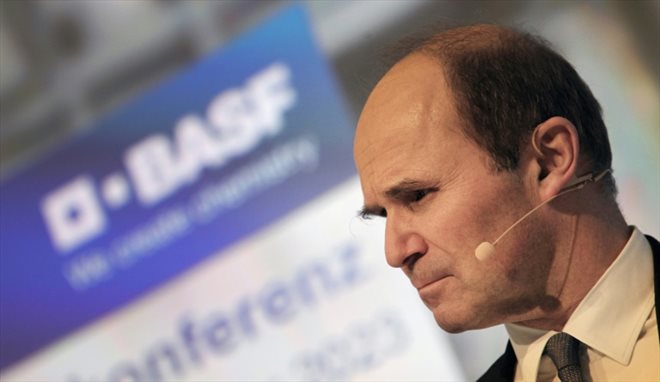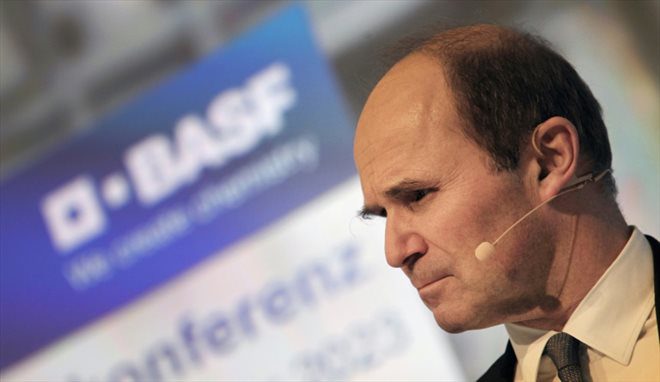At the headquarters of chemical giant BASF in Ludwigshafen, western Germany, on February 24, 2023 (AFP/Daniel ROLAND)
The era of cheap gas is over: the German chemical giant BASF will close several production units on its historic site and cut a total of 3,300 jobs worldwide.
In its gigantic complex in Ludwigshafen on the banks of the Rhine, with around 39,000 jobs, the chemist will internally reclassify 700 positions, lost following the closure of units producing in particular ammonia and “TDI” used to manufacture foams and other adhesives.
The group also wants to reduce its costs worldwide by eliminating 2,600 net jobs, once reclassifications have been counted, in central services and research, avoiding dry layoffs.

Martin Brudermüller, CEO of chemical giant BASF, at the group’s headquarters in Ludwigshafen, western Germany, on February 24, 2023 (AFP/Daniel ROLAND)
“The competitiveness of the European region” of BASF suffers from “high costs for most factors of production”, explained the boss of the group Martin Brudermüller.
The chemical giant paid 2.2 billion euros more for gas last year than in 2021, although consumption fell by 35% mainly due to production stoppages in Ludwigshafen. In 2021, this site represented 4% of all gas consumption in Germany.
BASF announced last year that it wanted to devote 500 million euros per year over 2023 and 2024 to reduce its charges, noting that gas prices should not return to pre-war levels in Ukraine.
Gas prices have certainly fallen since then, but they could tighten again this year as China, which has returned from the “zero Covid” policy, reopened its economy.
– Site closures –
The closures announced on Friday target one of the two ammonia-producing units in the industrial complex in Ludwigshafen, another producing caprolactam, used to produce plastic and fibers, as well as associated fertilizer units.
A caprolactam plant in Antwerp, Belgium, will in future meet internal demand and that of the European market on its own, explains the group.
Other units producing cyclohexanol and cyclohexanone, for the manufacture of nylon, as well as heavy soda, finally an adipic acid unit used to produce synthetic materials, will also close.
The production of this acid via a joint venture in France with Domo in Chalampé (Haut-Rhin) will continue.
Finally, the site from which the TDI comes out, in which more than one billion euros has been invested, will close due to its underutilization. Customers will be served from locations in the United States and China.
Employee representatives strongly criticized these announcements.
“Dismantling installations and eliminating jobs is not a suitable strategy for the future success of the sites,” said Michael Vassiliadis, of the IGBCE union, in a press release.
The works council has called on the group to “invest more” in future sectors, such as hydrogen and renewable energies, to “keep significant chemical production in Europe”.
– The Stock Exchange sanctions –
BASF, which produces chemicals for automobiles, agriculture, construction, is aiming for an operating profit of at best 5.4 billion euros in 2023, lower than that of 6.9 billion euros released in 2022, which was already down 11%.
Sales should reach a maximum of 87 billion euros, which would represent the same level as last year.
After the expropriation of the Wintershall DEA subsidiary in Russia, active in oil and gas, BASF organized the withdrawal of this entity from the country and consequently corrected its value by 6.5 billion euros.
Adding the loss suffered on the Nord Stream 2 gas pipeline site between Russia and Germany, abandoned in the wake of Russian aggression, the group’s overall result fell into the red in 2022, from 627 million euros. .
The group will nevertheless pay a dividend of 3.40 euros per share, stable compared to 2021.
BASF, on the other hand, is ending its share buyback program launched in January for 3 billion euros and half of which has since been consumed.
On the Frankfurt Stock Exchange, investors sanctioned the title which lost nearly 7% at 14:00 GMT
© 2023 AFP
Did you like this article ? Share it with your friends with the buttons below.




